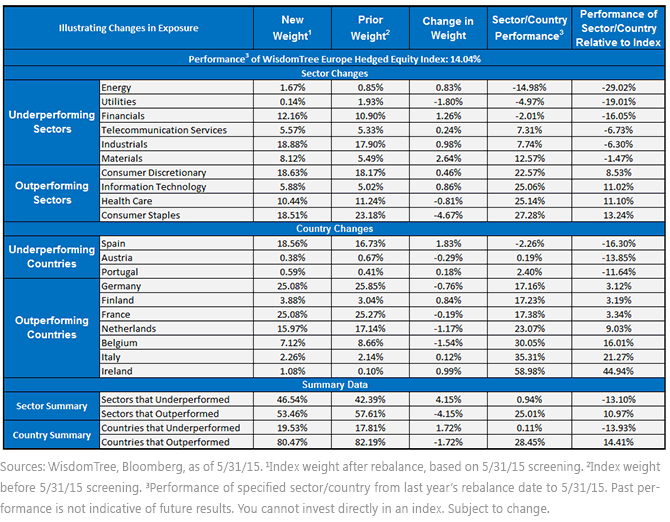Europe has been a bright spot for equity market performance thus far in 2015. One broad index of eurozone stocks—measured in euros—was up over 18% through May 29, while the
S&P 500 was up just 3%.
1
That said, due to the decline in the euro over this period, U.S. investors had to
hedge exposure to the euro to receive these returns; otherwise, returns were over 10 percentage points lower.
2
Trimming Big Winners
The strong gains in European markets has led some strategists to suggest that certain European stocks are getting richly priced. The year-over-year change in eurozone
dividends from last year’s rebalance was just 8.5%,
3 suggesting that overall the market gains are coming from rising
valuation multiples.
Consumer Staples have been particularly called out for their gains. Consumer Staples stocks are often large global multinationals that over time should benefit from a weaker euro.
Since last year’s rebalance of the
WisdomTree Europe Hedged Equity Index, the Consumer Staples sector, which at nearly one-quarter of the Index weight represented the largest sector exposure, had the greatest returns (up over 27%) while the broader Index was up only 14% over the period.
It is these types of gains—especially when stocks are rising more than their
fundamentals—that create opportunities to conduct a
relative value rebalance in search of better
valuations.
Sector Changes at This Year’s Rebalance
WisdomTree’s developed international dividend-weighted Indexes rebalance every June. Below we outline the major sector and country changes that occurred at this year’s rebalance of the WisdomTree Europe Hedged Equity Index.
• Reducing Consumer Staples: The biggest change was the reduction by 4.7% allocated to the Consumer Staples sector. Another notable outperforming sector was Health Care, which had returns over 25% and saw its weight reduced by almost 1 percentage point.
•
Adding Weight to Cyclicals: The sectors that added weight were some of the more cyclical sectors—Financials, Materials and Industrials collectively received the increased weight that Consumer Staples lost. All three of these sectors had below-average returns since the last rebalance. Notably, after the rebalance both the Consumer Discretionary and Industrials sectors will have greater weights than the Consumer Staples sector.
• Technology with Good Returns, Increased Weight: The Tech sector is one sector whose weight increased despite having gains over 25%. This is because Tech dividends grew even more—eurozone technology stocks had dividends that grew over 30%, leading growth in all sectors and causing an increase in weight.
Country Changes Not as Significant
On a country basis, there were fewer changes of notable magnitude. The greatest increase in weight came from Spain and is related to some of the large Financials that had underperformed, as discussed above. The Netherlands and Belgium had stocks in the Consumer Staples and Health Care sector that saw their weight decreased, which is why those countries saw their weights lowered. There was a marginal increase in weight to some of the peripheral countries such as Spain, Italy, Portugal and away from Germany, France and the Netherlands, but, again, these were smaller changes than the sector changes discussed above.
Details behind Sector & Country Changes

In general, what powers the changes in weight at WisdomTree’s annual rebalance is a disciplined process focused on relative valuations. These changes generally can be described as:
• Stocks getting more expensive—measured on a price-to-dividend basis—receive less weight
• Stocks getting less expensive—measured on a price-to-dividend basis—receive more weight
As investors look abroad for global opportunities, WisdomTree believes
currency hedging is an important strategy for reflecting and capturing what is happening in the local equity markets—without additional noise from the currency movements.
With the increased flows and attraction to these strategies, WisdomTree believes the valuation sensitivity baked into WisdomTree’s Index methodology makes its hedged strategies more attractive.
1“Eurozone stocks” refers to the MSCI EMU IMI universe, with performance measured from 12/31/14 to 5/31/15. Source: Bloomberg.
2Returns of the MSCI EMU IMI measured in U.S. dollars were more than 10% below those of the MSCI EMU IMI measured in euros.
3Refers to the year-over-year change in
Dividend Stream® for the universe of companies in the WisdomTree DEFA Index that are incorporated in the eurozone. Period: 5/31/14 to 5/31/15 Index screening dates.
Important Risks Related to this Article
Investments focused in Europe increase the impact of events and developments associated with the region, which can adversely affect performance. Dividends are not guaranteed, and a company’s future ability to pay dividends may be limited. A company currently paying dividends may cease paying dividends at any time. Foreign investing involves special risks, such as risk of loss from currency fluctuation or political or economic uncertainty.


 In general, what powers the changes in weight at WisdomTree’s annual rebalance is a disciplined process focused on relative valuations. These changes generally can be described as:
In general, what powers the changes in weight at WisdomTree’s annual rebalance is a disciplined process focused on relative valuations. These changes generally can be described as:


